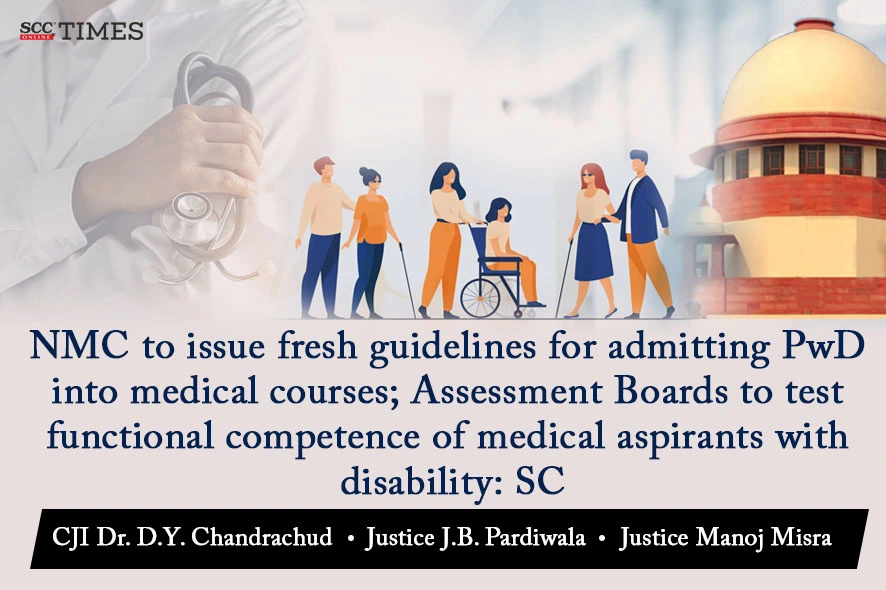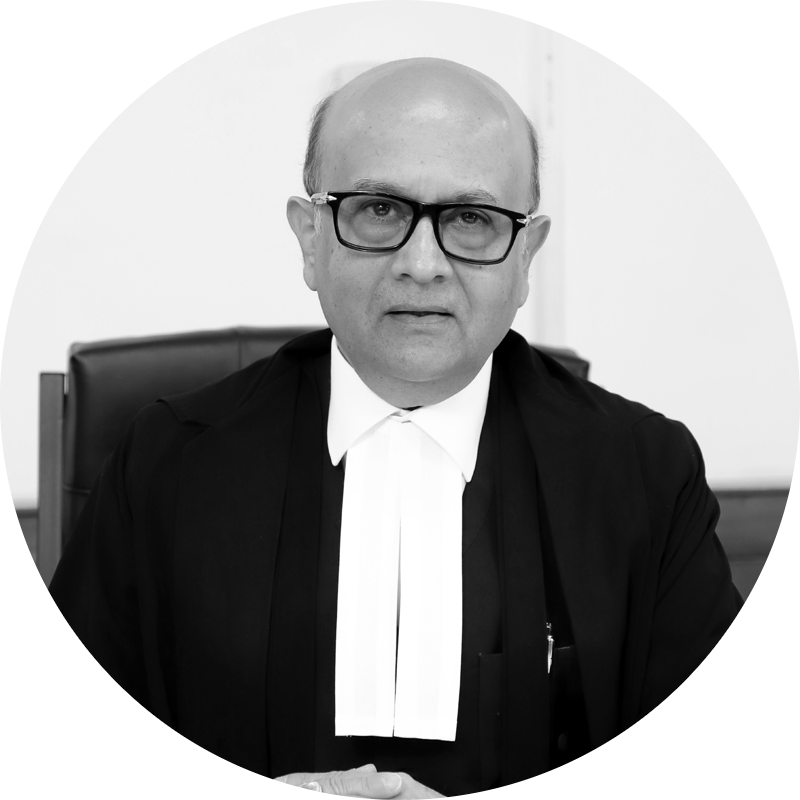Supreme Court: In a civil appeal against a decision of the Bombay High Court dismissing the NEET aspirant’s writ petition challenging the NEET Disability Certificate holding him 88% disabled and ineligible to pursue an MBBS/Dental course, and holding that the certification of the degree of disability was in accordance with prescribed procedures, the three-Judge Bench comprising of CJI Dr. DY Chandrachud*, JB Pardiwala and Manoj Misra, JJ. set aside the impugned judgment of the High Court and the report of the Disability Assessment Board of AIIMS, Nagpur for failing to apply the statutory and regulatory standards applicable to the assessment of a person with disability.
The Court directed for the creation of a supernumerary seat at the AIIMS, Nagpur and the seat shall be allocated to the appellant, provided that he has not already secured a seat at a college of his choosing. The Court also directed that the role of the Disability Assessment Boards must be tailored (with a functional competency approach) only for the course which the candidate seeks to pursue.
Background
The present appellant/ NEET aspirant has lower limb myopathy – a locomotor disability. He appeared for the NEET UG Examination 2024 on 5-05-2024 under the unreserved/EWS-PwD category and secured 601 marks (out of a total marks of 720) and was placed at an all India PwD rank of 84 and a State PwD rank of 4. Despite having a Disability Certificate dated 24-01-2021 valid until 2025 — the appellant got himself assessed to get his eligibility certified by a designated medical board at AIIMS, Nagpur. Appendix “H-1” of the Guidelines regarding admission of students with ‘Specified Disabilities’ under the Rights of Persons with Disabilities Act, 2016 with respect to admission in MBBS Course prescribes that persons having over eighty percent disability may be admitted to a medical course on a case by case basis after assessing their functional competence to navigate academic and practical requirements. The Board, by a NEET Disability Certificate dated 13-09-2024, opined that the appellant is 88% disabled and is therefore ineligible to pursue an MBBS/Dental course.
On 3-10-2024, the Court directed the appellant to appear before a medical board at AIIMS, Delhi to reassess him keeping in mind the circular issued by the first respondent-Director General of Health Services (‘DGHS’) on 24-03-2022. The circular inter alia made mandatory directions to include a doctor or health professional with disability in every Disability Assessment Board. The five-member board submitted its report finding no changes in most disability components despite assistive devices. The report also stated that there are no clear guidelines available to assess the disability with assistive devices. The report adjudged the disability of the appellant to be 80% down from 88%.
The Court noted the lack of clear guidelines and observed that the AIIMS report failed to evaluate the (i) extent of functional disability of the appellant; and (ii) the extent to which the use of assistive devices would have the potential to bring the functional disability within the permissible limits in terms of the government notification.
Subsequently, on Court’s request Dr. Satendra Singh of Infinity Ability assisted the Court on whether notwithstanding the quantified disability, the appellant could pursue the MBBS degree course. On basis of the functional assessment that the appellant underwent which included being given various instruments which he would be required to use in his course and profession, the report outlined the overall assessment of the appellant and declared him to be suitable, with appropriate clinical accommodations, to pursue MBBS.
With permission to participate in the then-ongoing counselling process arising out of NEET UG 2024, the appellant re-entered the NEET counselling process after a lapse of valuable time. The appellant further submitted that none of the nine colleges which allocated him a seat were compliant with accessibility norms and adequate support systems necessary for him to enjoy a level playing field. The appellant sought directives on how the grievances of exclusion of disabled candidates are to be considered inter alia by Courts.
Analysis and Decision
The Bench noted that the appellant was subjected to protracted and mentally exhausting assessments that failed to apply the correct standards, leading to a declaration of ineligibility and said that his first journey by air was not for leisure or education but to undergo a medical assessment in Delhi by an order of this Court. In this process, valuable time was lost, and the appellant faced intrusive and irrelevant questioning.
The Bench stated that-
“persons with disabilities often confront systemic failures that engender a deep sense of disappointment – a disappointment that reflects the frequency and predictability with which the system fails them. Those with disabilities who aspire to succeed must not only plan meticulously but also brace themselves for the barriers they will inevitably face due to their disabilities.”
The Court noted that Appendix H-1 stipulates that assessments, particularly for individuals with locomotor disabilities exceeding 80%, should focus on evaluating functional competence. The Court pointed out that this functional competency test serves two critical purposes, first, it emphasizes the abilities of the person with a disability, assessing their capability rather than their limitations; and second, it mandates an evaluation rooted in practical relevance, aligning the candidate’s abilities with the functional requirements of the MBBS curriculum.
“When reasonable accommodation is denied to a person with disability, it amounts to discrimination and violates the fundamental rights of the aggrieved person and the preambular virtue of fraternity along with justice, liberty and equality. Persons with disability are not objects of pity or charity but an integral part of our society and nation. The advancement of rights for persons with disabilities is a national project along with eradication of all forms of discrimination. A component of this project is the inclusion of persons with disabilities in all pursuits of life.”
The Court emphasised that the inclusion of persons with disabilities within medical practice is vital to ensure that the approach of the medical community and of hospitals and other healthcare institutes is humane, sensitive and informed by lived experiences. It strengthens our fraternity. Therefore, the process through which medical aspirants with disability enter the profession must be compatible with constitutional and statutory entitlements and guarantees. Hence, the Disability Assessment Boards must comply with rule of law principles by injecting transparency, fairness and consistency in their approach. The Boards must further elaborate on the reasons for the outcome of their assessment, in particular when they opine that the candidate is ineligible. The Court also suggested that the Disability Assessment Boards must focus on the functional competence of persons with disabilities and not merely quantify the disability. The quantification of disability is a task in need of a purpose within the human rights-based model of disability. The functional competency approach to assessment for a medical course is globally recognised. To enable members of the Assessment Boards in effectively applying the functional competency test, they must be adequately trained by professionals and persons with disabilities or persons who have worked on disability justice and these trainings must be with a view to enhance the understanding of the Board members in assessing persons with disabilities and must not pathologize or problematize them.
Further, the Court directed that the NEET Examination and college must also comply with accessibility norms. The application portal for NEET Examination must outline the accessibility compliances of different colleges to enable prospective students with disabilities in making an informed decision. Once admitted, the Enabling Units established under the directions of the University Grants Commission must act as a point of contact for persons with disabilities to access clinical accommodations. Students must be informed about the Enabling Units and Equal Opportunity Cells through the information booklet circulated for new MBBS students, the college website and the Equal Opportunity Policy under Section 21 of RPWD Act. The Court directed the National Medical Council to make appropriate directions in this regard.
The Court noted that the National Medical Council submitted that in light of the judgment of this Court in Omkar Ramchandra Gond v. Union of India 2024 SCC OnLine SC 2860, it will be constituting a new committee of domain experts to comply with the directions in that judgment. Additionally, the Court directed that this committee shall include persons with disability or one or more experts who are well conversant with disability rights. The committee shall recommend fresh guidelines to replace the existing guidelines.
Conclusive Directions
-
The NMC shall issue fresh guidelines for admitting persons with disabilities into medical courses. The committee formulating the guidelines must include experts with disability or persons who have worked on disability justice. The guidelines shall comply with the judgments of this Court and contemporary advancements in disability justice.
-
The Disability Assessment Boards shall eschew from a benchmark model to test the functional competence of medical aspirants with disability. The NMC shall issue appropriate guidelines in this regard, and shall include a doctor or health professional with disability as per the directions of the dated 24-03-2022.
-
The conduct of the Disability Assessment Boards shall be fair, transparent and in compliance with principles of the rule of law. Attention must be paid to ensure that candidates appearing before the Board do not feel uncomfortable on account of physical or attitudinal barriers.
-
Reasonable accommodation is a gateway right to avail all other fundamental, human and legal rights for persons with disabilities. Non-availability of reasonable accommodation amounts to discrimination and violates substantive equality of persons with disabilities.
-
Applicants to the NEET examination must be informed about the compliance of accessibility norms and provisions of reasonable accommodation available at colleges. The respondents shall issue appropriate directions to create a database with relevant information on accessibility and reasonable accommodation.
-
Enabling Units at medical colleges shall act as points of contact for persons with disability desirous of accessing clinical accommodations.
CASE DETAILS
|
Citation: Appellants : Respondents : |
Advocates who appeared in this case For Petitioner(s): For Respondent(s): |
CORAM :









